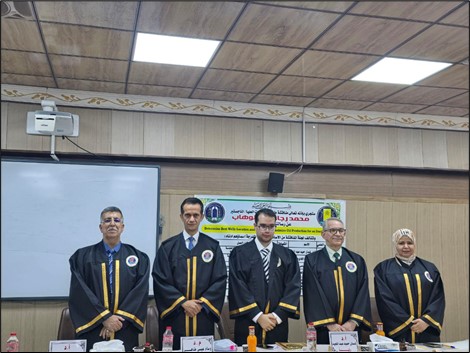The Dean of the College of Engineering at the University of Baghdad, Prof. Dr. Ghassan Hamid Abdul-Majeed, chaired the master’s thesis defense of student Mohammed Raja Abdulwahab from the Department of Petroleum Engineering, for his thesis titled “Optimization of Well Placement Using Machine Learning to Enhance Oil Production in an Iraqi Oil Field.” The defense took place in the department’s discussion hall under the supervision of Prof. Dr. Iyad Abdulhaleem Abdulrazzaq.
The thesis aimed to develop an advanced approach to optimize oil field exploitation more efficiently and effectively than traditional methods by integrating reservoir simulation with artificial intelligence and machine learning algorithms. This integration enables the identification of optimal production and injection well locations to maximize output and achieve higher economic value for oil fields.
The study was conducted on the Abu Amood field in the Zubair reservoir, where a 3D reservoir model was constructed after predicting key properties such as porosity and permeability with 85% accuracy, using an automated machine learning framework.
Results showed the effectiveness of the DeepEnsemble model in improving field development plans under two different scenarios:
- Production-only scenario: The model achieved a 15.9% recovery factor, recommending the closure of two wells and drilling 23 new wells, leading to a net present value (NPV) of $9.8 billion and a cumulative production of 220 million barrels of oil.
- Production with water injection scenario: The recovery factor increased to 22%, with recommendations to close three old wells, drill 22 production wells, and 17 injection wells, resulting in an NPV of $11.3 billion and a cumulative production of 305 million barrels.
Remarkably, the model achieved these precise results using only 300 simulation runs, demonstrating its efficiency and robustness as a decision-support tool for oil field development planning.
Based on these findings, the study recommends applying the proposed methodology to other oil fields, leveraging machine learning models to accelerate simulations and improve accuracy, while considering multiple production scenarios to ensure optimal field development strategies and maximize economic returns.
After a thorough scientific discussion and evaluation by the examining committee, the researcher was awarded the Master’s degree in Petroleum Engineering.







